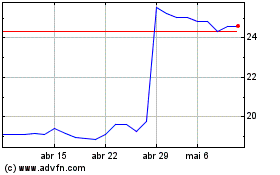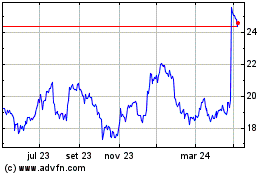Europe-China Deals Receive More Scrutiny From Key U.S. Panel
25 Janeiro 2016 - 6:02AM
Dow Jones News
(FROM THE WALL STREET JOURNAL 1/25/16)
By Shayndi Raice
LONDON -- The U.S. government body that screens corporate
takeovers for security concerns is scrutinizing an increasing
number of high-profile deals in which neither party is
American.
The group, known as the Committee on Foreign Investment in the
U.S., or CFIUS, has long examined deals in which foreign companies,
especially Chinese ones, try to purchase U.S. assets. But a recent
surge in Asian takeovers of European companies that own businesses
in the U.S. has put the panel in the delicate position of trying to
police overseas deals.
On Friday, Philips NV said it was terminating its $2.8 billion
deal to sell its lighting-components and automotive-lighting
business to Go Scale Capital, an investment fund led by Chinese
venture-capital firm GSR Ventures.
That deal -- with neither of the principal actors being American
-- wouldn't be considered a likely target for CFIUS to inspect for
potential impacts on U.S. national security. But the Philips
business that is on the block, called Lumileds, has a large
portfolio of U.S. patents for light-emitting diodes, or LED, and a
sizable presence in the U.S. through manufacturing and
research-and-development facilities in San Jose, Calif. That,
apparently, was enough to attract the attention of CFIUS, which
blocked the deal.
CFIUS's increasingly proactive approach toward deals that don't
directly involve U.S. parties is causing angst among some European
executives, deal makers and lawyers.
CFIUS sometimes exerts its power "in a way that observers kind
of scratch their heads and say, 'Really?' " said Robert Profusek,
the global chair of mergers and acquisitions at the law firm Jones
Day. By their logic, he added, "almost anything is a CFIUS
deal."
CFIUS doesn't itself have the power to reject transactions. If
it spots potential problems, it can recommend that the companies
modify the terms of their deal, for example, by shedding U.S.
assets, or it can recommend that the U.S. president nix the
transaction. A presidential veto has only happened twice; more
often, as was the case with Philips, the companies abandon
transactions that CFIUS frowns upon.
Besides the scuttled Philips deal, last year's $16.6 billion
merger between the Finnish wireless-equipment company Nokia Corp.
and French firm Alcatel-Lucent SA underwent CFIUS scrutiny.
Alcatel-Lucent had a joint-venture with China's Shanghai Bell. The
deal ultimately went forward, though it is unclear if the parties
had to make concessions to ensure CFIUS's backing. The details
around CFIUS's scrutiny remain secret.
Experts on the government-review process believe a sale of Swiss
pesticides giant Syngenta AG could also get caught in a CFIUS
review if a deal proceeds with China National Chemical Corp. or
ChemChina, because of Syngenta's U.S. holdings. Syngenta declined
to comment.
The increased oversight comes as regulatory and
national-security scrutiny of deals globally has become more
common, increasing what companies need to do to get deals across
the finish line.
After General Electric Co. went after France's Alstom Group in
2014, for example, the French government expanded the scope of its
national-security reviews of foreign acquisitions to include a
broader range of industries. No deals have yet been killed, but
several have been scrutinized, said one CFIUS lawyer.
"National-security reviews are expanding around the world and
the national-security issues are broader as the supply chain
globalizes," said Ivan Schlager, a CFIUS attorney with the law firm
Skadden, Arps, Slate, Meagher & Flom LLP.
CFIUS's mandate hasn't changed. What has changed is the nature
of deals that are being struck, as globalization means U.S. assets
could end up in the hands of a wider array of companies.
(END) Dow Jones Newswires
January 25, 2016 02:47 ET (07:47 GMT)
Copyright (c) 2016 Dow Jones & Company, Inc.
Koninklijke Philips NV (EU:PHIA)
Gráfico Histórico do Ativo
De Mar 2024 até Abr 2024

Koninklijke Philips NV (EU:PHIA)
Gráfico Histórico do Ativo
De Abr 2023 até Abr 2024
